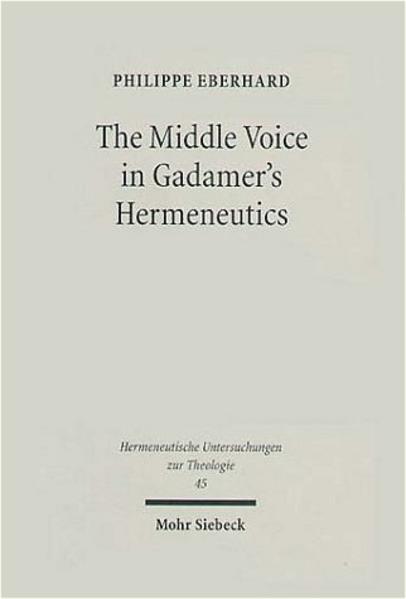EBERHARD,P., The Middle Voice in Gadamer's Hermeneutics. Tübingen 2004.
The Middle Voice in Gadamer’s Hermeneutics. A Basic Interpretation with some Theological Implications. 1. Aufl. Tübingen, Mohr Siebeck, 2004.
24 x 16 cm. VIII, 251 S. Leinen. (Hermeneutische Untersuchungen zur Theologie, 45). ISBN 9783161481574.
Philippe Eberhard proposes a medial interpretation of Hans-Georg Gadamer’s philosophical hermeneutics and draws theological implications concerning faith and our human condition from a Christian humanist standpoint. He brings into focus the middle voice as a way to articulate what it means to listen to language and the Word. His thesis is twofold. First, the hermeneutic event is medial throughout. The core of the mediality of hermeneutics is the subtle balance between the event of understanding, which happens to the subject, and the subject who understands within it. Second, the mediality of understanding is the primary reason why hermeneutics is theologically meaningful. Both understanding as well as faith and theology are medial experiences leading to an always renewed understanding of what it is to be a human being in the world. The author analyzes the notion of the middle voice from a linguistic as well as from a philosophical standpoint and establishes that the middle voice is conspicuous by its absence in most commentaries about Gadamer: usually mediality shines between the lines but does not receive any explicit treatment. The author describes understanding as an event following Gadamer’s notions of play, fusion of horizon(s), and linguistic speculation and considers the same event from the standpoint of the subject within it. Though understanding is an event that happens to the subject, the subject is not passive but involved. The examination of Gadamer’s use of theology leads to the argument that he tends to exclude the Christian kerygma from the hermeneutic event. Gadamer does not apply back to theology the insights he gained from it for his description of hermeneutics. Philippe Eberhard, by contrast, includes the kerygma and faith in hermeneutics and proposes a medial account of faith based on the medial interpretation of hermeneutics. Finally, the conclusion sums up the argument and goes one step further: although faith is a hermeneutic experience, it differs from hermeneutics because it is not only a constant effort to be at home in the world, but above all it keeps questioning the world that is to be our home.
Order Number: 1590VB
Fixed Retail Price: EUR 104,--

